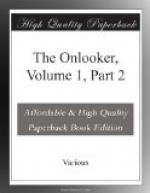“Mr. Croker was home ten days before he missed his leadership, and even then he was made aware of its spoliation only by beholding it in the hands of the cabal. Mr. Croker meant Mr. Nixon for the mayoralty; but the plotting eighteen, intriguing with Brooklyn blocked the way with Mr. Coler. The coalition was too strong for Mr. Croker to force, and the logic of that same word pressed to a conflict meant his destruction in the city convention.
“‘When the lion’s skin is too short,’ said Lysander, ’we piece it out with the fox’s,’ and while the Greeks thought this sentiment unbecoming a descendant of Hercules, they were fain to acquiesce in its practice when met by a peril too strong for their spears. Mr. Croker remembered Lysander; and, being thus hedged and hemmed about, sought safety by nominating Mr. Shepard. There need be no mistake; Mr. Shepard was not a candidate, he was a refuge. And such a refuge as is Scylla when one is threatened of Charybdis.
“When Mr. Croker seized on Mr. Shepard, he defeated the Coler plot, but made no safety for his leadership. He succeeded only in losing the latter in a fashion less harrowing to his vanity, less obnoxious to his self-respect. It was the old Roman at the last, who, preferring suicide to capture, throws himself on his own sword.
“Study the situation as Mr. Croker studied it, following the city convention; it will aid to an understanding of what has happened since, and tell the story of his lost leadership. Following Mr. Shepard’s nomination there lived no Croker hope. With either Mr. Shepard or Mr. Low elected, Tammany would dwindle—as one now beholds it—to be a third-rate influence. The autocracy of Mr. Croker would disappear. At the best, he might beg where he had once commanded, with every prospect of being denied. Mr. Croker, in alarm for his pride, decided that his sole chance to quit with credit was to quit at once, and on that thought he acted. Following the naming of Mr. Shepard he treated with the plotters and abandoned to them half his dominion. It was they, and not Mr. Croker, who determined the personnel of the late county and borough tickets; one has but to remember the folk who were named, and recall those who were not, to know that this is true. But bad fortune overtook Mr. Croker and the eighteen who then held him in partial thrall. The city ticket of the one, and the county and borough tickets of the others, were beaten.”
“They were, of a hopeful verity!” interrupted Fatfloat. “They were beaten as flat as a field of turnips! And it was in high good time, too. Had Tammany retained the city, before 1904 the outlaws would have stolen everything but the back fence.”
“They did not keep the city, however,” continued Enfield, “and being defeated, Mr. Croker developed with much speed an eagerness for England. I do not blame him; while outwardly respectful, the leading folk of his circle were cheerless and cold, for to be beaten is to be hated in Tammany Hall. And so he made pretense of abdication and Mr. Nixon appeared in his place. The sequel of that ill-fortuned substitution is known.




